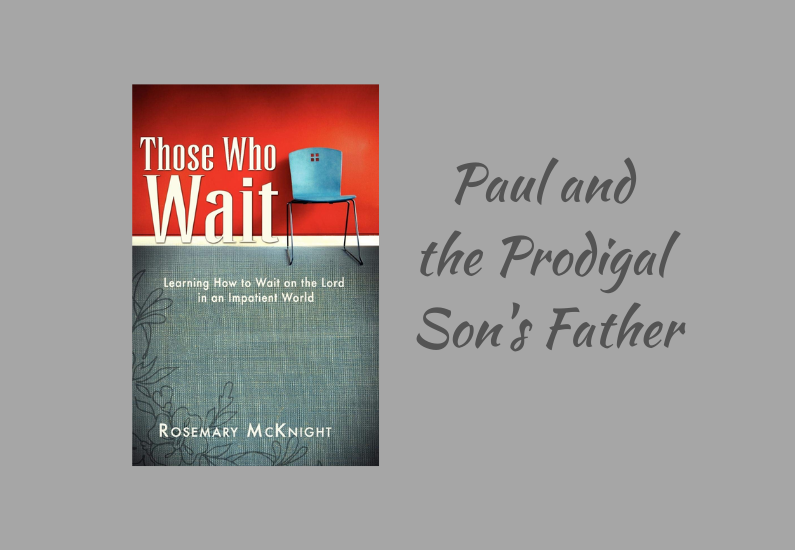Paul and the Prodigal Son’s Father
Tonight our Ladies’ Bible Class will be studying the last lesson out of the study book we’re using — Those Who Wait by Rosemary McKnight. It has been a good study. We’ve learned a lot about what it means to wait and let God work in His own time on His schedule. It’s a hard concept for many of us to master — especially women. Many of us tend to be a tad controlling. We are used to managing our households and getting things done that need to get done. The though of turning over the control of it all to someone else is quite daunting. When we learn to turn the control, the worry, the time table, etc. to God it is such a relief and everything works so much smoother.
Tonight’s lesson will concentrate on 2 Bible characters that waited on God — not necessarily for physical needs but spiritual. Paul waited to find out what God had planned for him, he waited as he was sitting in prison he waited as he begged God to take away his thorn in the flesh. The prodigal son’s father waited on his son to come home.
During this book we have talked about several Bible characters and the waiting they did. There are many more to study but hopefully by studying this book we will more readily recognize when a Bible character is waiting appropriately on the Lord. Hopefully we’ll also recognize when a fellow Christian or a dear friend/family member is waiting as well and can offer encouragement as they wait. Maybe even more important is that we have learned to recognize when we are waiting and the things we can do to ease the time by helping others and improving ourselves during this period of waiting.
In previous lessons we studied Joseph (waiting in the pit, waiting in prison), Job (waiting during his period of mourning), Elijah (waiting when he thought he was the only righteous man left) and Jesus (showed us that preparation in waiting is essential — prayed before he chose apostles, prayed before his crucifixion)> There is also Noah who waited 100 years while he built the ark God requested of him and then waited a year in the ark before he could leave it. David waited as he knew that his son would have to die because of his sins with Bathsheba. Then, wanting to build God a temple, he had to wait and prepare for things so his son Solomon could built it.
Paul
But we’re going to talk about Paul and the prodigal son’s father tonight. Saul as he was first named did everything he could to fight Christianity. He was a violent blasphemous man (his own words). Not someone we would typically think “I’m going to talk to him about Jesus”. God saw it differently. After his encounter with Jesus on the road to Damascus he was instructed to go to Damascus and wait. He was blind. He was helpless. He was distraught over the realization that he had been wrong. God told him to wait. He didn’t know how long. He didn’t really know what for. After 3 days, God sent Ananias to heal Saul of his blindness and instruct him what he must do (Acts 22:16) What did Saul (whose name is now Paul) do? Read 1 Timothy 1:12-14.
Paul waited even more. He asked God to remove his thorn in the flesh. We don’t know what it was but we know that Paul didn’t like it and wanted it removed. God said, “No”. Read 2 Corinthians 12:7-9 What was Paul’s reaction? Read 2 Corinthians 12:10 — “for when I am weak, then I am strong”. Interesting. That’s not the way we usually think of things. God thinks differently than we do. We are made strong when we are weak and learn to depend on God. When we think we’re strong, we’re not. When we are strong, we are depending on ourselves — not God.
Paul waited through imprisonments and persecutions. Read 2 Corinthians 11:23-28 for a list of persecutions he endured. How would we react to someone we knew that was constantly being tormented like this? Would we think what a wonderful Christian he was or begin to wonder if he didn’t deserve it — at least a little. God wouldn’t let things like this happen to someone who is serving Him — would He? He would, He did and He will again. We need to learn from Paul and realize that being a Christian is not an easy life. The goal is not to have things and comforts here on earth. Our one desire is to live in the house of the Lord (Psalm 27). Paul’s persecutions and his imprisonments were used God for good. His imprisonment in Jerusalem would eventually take him to Rome (where he had been wanting to go and where God said he would go). I’m sure that wasn’t the method Paul would have chosen to get there but God used him, used the Roman government to fulfill His needs and get Paul to Rome.
As Paul’s life was nearing its end he wrote about his conflicting feelings about living on or dying. Read Philippians 1:21-24. We would all be more content in life if we looked at life as Paul did. We want to live because it is good for our loved ones that we can help them through their ups and downs but it would be better to die and be with Christ for eternity.
What can we learn from Paul?
1. There are people who are waiting for us to teach them truth. Paul waited on Ananias. There are people waiting on us. Get up and teach someone. Step out of your comfort zone and start talking to your friends/family/acquaintances about God. They are waiting for you. Realize that it’s not up to us to determine if someone is going to accept what the Bible says. Like the sower (1 Corinthians 3:7,8) we are to spread the good news far and wide and it will fall on sincere and honest hearts (as well as those not so sincere and honest).
2. “What are you waiting for?” That what Ananias asked Saul. Are you waiting to do what God wants you to do? Have you caused God to wait on you? Get up and do what needs to be done. If it’s to become a Christian — do it. If it’s to do something good that you know needs done — do it. James 4:17: “Therefore, to him who knows to do good and does not do it, to him it is sin.”
3. God may say “no” to some of our requests. He did to Paul. I’m sure He has to you as well. We are to accept His choice for us and go on with things. Our first baby died at 1 week old. We prayed and asked God to heal him. He didn’t. We had to accept it and go on. We had to learn to use that experience to help others. It would have been devastating indeed to sit back and give up because we didn’t get our way.
4. Our waiting has a purpose. Paul said in Philippians 1:12: “…what has happened to me (remember all the persecutions and imprisonments?) has really served to advance the gospel”. What did he do while he was in prison? He taught — anyone and everyone that would listen. People in high places listened to him and learned — some even obeyed. God used Paul to further His good news to people that might not otherwise have heard it.
5. To be with Christ is better by far. Read 2 Corinthians 4:17. What ever problems we have here on earth only make heaven all that more precious. Don’t be saddened, discouraged or down trodden over your disappointments. Realize that what happens here is only important as a means of getting there. Death is what we ought to be looking forward to instead of dreading. Death is a victory to the faithful child of God. Psalm 116:15
The Prodigal Son’s Father
This is one of the most touching stories in the Bible. Maybe it’s because it hits so close to home. Our children are precious to them and want them to grow up to be strong Christian adults that are solid citizens and able to live independently. It doesn’t always happen that way. Read Luke 15:11-24
The father knew his son. He knew that he would make mistakes. He gave him his inheritance anyway. Lesson learned? We can’t control our children’s lives forever. We must let go and let them fend for themselves. Sometimes, I think we as parents are so afraid that our child rearing skills were so lacking that our kids can’t make it without us. We don’t trust ourselves or our children. Sometimes, rightly so. That’s another lesson.
Imagine seeing your energetic, enthusiastic boy leaving with more money than he knows what to do with it to go find himself. The fact that he requested his inheritance from his father before his father was ready to give it to him shows what this boy’s character was like. The father is left with out his son. He doesn’t have the luxuries of internet and cell phones to keep in touch. His son is gone and he doesn’t know if he’ll ever see him again.
We don’t know how long his son was gone but his father was waiting on him when he came back. His father saw him coming a long way off. His father had never given up hope that he might see him come down the long road, back to home. I’m sure he frequently looked down the road each day in hopes that he would see just what he saw on this wonderful day — his son coming home. What a wonderful blessing. What a relief. What joy. It’s time for a celebration.
What can we learn from the prodigal son’s father?
1. God waits for His children who stray. What a comforting thought. This is what the whole parable of the prodigal son was all about. God is waiting for each and everyone of us to do His will. He’s not waiting on us to come back to Him on our terms. You’ll notice that the prodigal returned with a repentant heart realizing that he was not worthy of being called a son anymore. He came back willing to accept whatever punishment his father was going to deal out. That’s how we must turn to God — His way, not ours.
Did you get the importance of this? God waits on us! This is the God who made the whole world and everything in it. The same God that did all the fabulous miracles. The same God that loves us so much that He is willing to wait on us. But He can’t wait forever. There will come a time when it will be too late to return home. That could have happened with the prodigal son. He could have waited until his father had died to return. Where would the joy be then? It would have been too late. If we wait too long to do what God wants, it may be too late — our life has ended or Jesus has returned for the great judgement. Don’t make God wait any longer.
2. We should never quit waiting for those have left their spiritual Father. There are those that we know and love who have left God — or maybe never turned to Him to begin with. We cannot give up on them. We must continue praying for their return, looking for them to return, teaching them about God through our words and our example. Never give up! Read story about the mother who prayed for her children to return on page 134.
3. Wait with Compassion. Sometimes, we find this difficult to do. We must not become impatient with those who we are praying/waiting on. Then, when they do return to God, we must be compassionate towards them. It is not ours to punish them. We must welcome them back with open arms. We can’t put them on a probationary period where we watch them to see if they really mean it this time. That’s not our job. We are to love them and help them to do what’s right. Impatience, bitterness and harsh judgment has no place in the heart of a Christian.
4. When our waiting is over, it is time for a celebration. Read the other parables in Luke 15. Each one of these people found something they lost. They called their friends and family to rejoice with them. The prodigal son’s father threw a party to celebrate his son’s return. We should rejoice with those who rejoice. Just as the angels rejoice when one returns to God, so should we. Does that mean we have to throw a big party? No, although it wouldn’t hurt. We should celebrate through prayer, song and just being with one another. Let others know that you are so happy to have them back where they belong. Read Romans 12:15.
One last thought: There will be no waiting in heaven. Keep focused on spiritual matters — put aside physical wants and desires. Heaven is worth all the persecutions, imprisonments, struggles, waiting we could ever experience here on earth. Let’s help each other as we wait on our final goal. Read Psalm 27








0 Comments